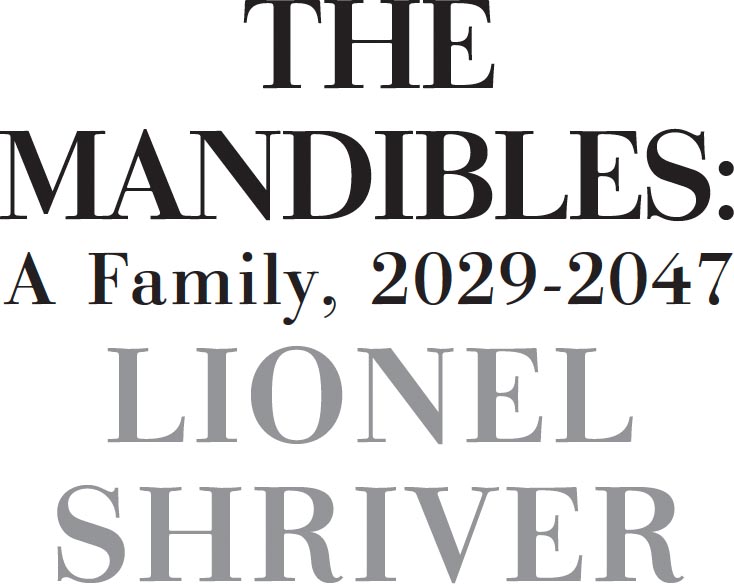
Полная версия
The Mandibles: A Family, 2029–2047



Copyright

The Borough Press
An imprint of HarperCollinsPublishers 1 London Bridge Street London SE1 9GF
www.harpercollins.co.uk
First published in Great Britain by HarperCollinsPublishers 2016
Copyright © Lionel Shriver 2016
Cover design by Claire Ward © HarperCollinsPublishers Ltd 2017
Cover photographs © Nick Fielding/Alamy (banknote, front); Shutterstock.com (all other images)
Lionel Shriver asserts the moral right to be identified as the author of this work.
A catalogue copy of this book is available from the British Library.
This novel is entirely a work of fiction. The names, characters and incidents portrayed in it are the work of the author’s imagination. Any resemblance to actual persons, living or dead, events or localities is entirely coincidental.
All rights reserved under International and Pan-American Copyright Conventions. By payment of the required fees, you have been granted the non-exclusive, non-transferable right to access and read the text of this e-book on-screen. No part of this text may be reproduced, transmitted, down-loaded, decompiled, reverse engineered, or stored in or introduced into any information storage and retrieval system, in any form or by any means, whether electronic or mechanical, now known or hereinafter invented, without the express written permission of HarperCollins.
Source ISBN: 9780007560776
Ebook Edition © 2017 ISBN: 9780007560769
Version: 2020-04-03
Praise for The Mandibles: A Family, 2029–2047
‘The Mandibles is so dazzlingly good that it might even mean Lionel Shriver won’t be described as “best-known for We Need To Talk About Kevin” for the rest of her career’
Reader’s Digest
‘As ever, Shriver cuts close to the bone! … Distinctly chilling’
Independent
‘A tale that fizzes with ideas and jokes … the comedy is pitch black’
The Times
‘All too chillingly plausible … a profoundly frightening portrait of how quickly the agreed rules of society can fall apart without money to grease the wheels’
Observer
‘Shriver is fast becoming the go-to novelist for some of the big issues of the day … breezy, mordantly comic … if the test of a futuristic novel is its eerie proximity to the present, this passes with flying colours’
Daily Mail
‘A powerful work investigating the fragility of the financial world. Prescient, imaginative and funny, it also asks deep questions’
Economist
‘Impressively sweeping … Shriver’s intelligence, mordant humour and vicious leaps of imagination all combine to make this a novel that is as unsettling as it is entertaining in its portrait of the cataclysmic unravelling of the American dream’
Financial Times
‘A sharp social eye and a blistering comic streak … her focus on nailing down the economic nitty-gritty of her plot is only one piece of the great, disconcerting fun she has in sending the world as we know it so vividly to hell’
New Yorker
‘Hilarious and brilliant … scary in the best possible way’
Elle
‘A provocative and very funny page-turner’
Wall Street Journal
‘Shriver really makes you think about the nature of money … By the end, The Mandibles had got under my skin’
Evening Standard
‘The stuff of nightmares … Shriver cleverly balances tragedy with black comedy’
Sunday Express
‘It’s scaring the hell out of me’
TRACY CHEVALIER
‘Shriver is as brilliant, funny and incisive as ever’
Woman and Home
‘A scary, depressing and convincing horror story, akin to reading about teetering on the edge of a precipice while actually teetering on the edge of a precipice’
Spectator
‘Insightful and darkly funny’
Good Housekeeping
‘Her verve and ambition are impressive … Few writers since William Gaddis in his brilliant JR have had the chutzpah to take on America’s particular money madness’
Mail on Sunday
‘A gripping family saga’
Daily Telegraph
‘By turns blackly funny and deeply unsettling’
Independent
‘Shriver writes with brio and intellectual zest. She is fiercely intelligent, but she has the qualities and virtues of the classical novelist. The ideas are fascinating, and the characters are thoroughly imagined and convincing … her gloomy vision is so brilliantly depicted that her novel is wonderfully enjoyable. If we are going to hell in a handcart, she makes the journey great fun’
Scotsman
‘Imaginative’
Sunday Times
‘Dystopian fable punctuated by comedy so dark it practically disappears into the shadows … brilliantly unforgiving’
The Times
‘A gleeful nightmare, it made me snort with laughter even as I was shuddering’
SARAH WATERS, Guardian
‘Brilliant satire … frankly terrifying’
SARAH CHURCHWELL, Guardian
‘Searing … establishes her firmly as the Cassandra of American letters … I don’t remember the last time a novel held me so enduringly in its grip’
New York Times
‘The energy of Shriver’s style counteracts the remorselessness of her vision’
JANE SMILEY, Guardian
Dedication
TO BRADFORD HALL WILLIAMS.
Although you had little time for fiction,
you’d have liked this book.
Who would have imagined that a cantankerous
misanthrope would be so fiercely missed?
Epigraph
Collapse is a sudden, involuntary and chaotic form of simplification.
—James Rickards, Currency Wars
Contents
Cover
Title Page
Copyright
Praise for The Mandibles: A Family, 2029–2047
Dedication
Epigraph
2029
Chapter One: Gray Water
Chapter Two: Karmic Clumping
Chapter Three: Waiting for the Dough
Chapter Four: Good Evening, Fellow Americans
Chapter Five: The Chattering Classes
Chapter Six: Search and Seizure
Chapter Seven: The Warrior Queen Arrives in Carroll Gardens
Chapter Eight: The Joys of Being Indispensable
Chapter Nine: Foul Matters
Chapter Ten: Setbacks Never Bring Out the Best in People
Chapter Eleven: Badder Bitter Gutter
Chapter Twelve: Agency, Reward, and Sacrifice
Chapter Thirteen: Karmic Clumping II
Chapter Fourteen: A Complex System Enters Disequilibrium
2047
Chapter One: Getting with the Program
Chapter Two: So Tonight We’re Gonna Party Like It’s 2047
Chapter Three: Return of the Somethingness: Shooting Somebody, Going Somewhere Else, or Both
Chapter Four: Singin’ This’ll Be the Day That I Die
Chapter Five: Who Wants to Live in a Utopia Anyway
Keep Reading …
About the Author
Also by Lionel Shriver
About the Publisher
chapter one
Gray Water
Don’t use clean water to wash your hands!”
Intended as a gentle reminder, the admonishment came out shrill. Florence didn’t want to seem like what her son would call a boomerpoop, but still—the rules of the household were simple. Esteban consistently flouted them. There were ways of establishing that you weren’t under any (somewhat) older woman’s thumb without wasting water. He was such a cripplingly handsome man that she’d let him get away with almost anything else.
“Forgive me, Father, for I have sinned,” Esteban muttered, dipping his hands into the plastic tub in the sink that caught runoff. Shreds of cabbage floated around the rim.
“That doesn’t make sense, does it?” Florence said. “When you’ve already used the clean, to use the gray?”
“Only doing what I’m told,” her partner said.
“That’s a first.”
“What’s put you in such a good mood?” Esteban wiped his now-greasy hands on an even greasier dishtowel (another rule: a roll of paper towels lasts six weeks). “Something go wrong at Adelphi?”
“Things go nothing but wrong at Adelphi,” she grumbled. “Drugs, fights, theft. Screaming babies with eczema. That’s what homeless shelters are like. Honestly, I’m bewildered by why it’s so hard to get the residents to flush the toilet. Which is the height of luxury, in this house.”
“I wish you’d find something else.”
“I do, too. But don’t tell anybody. It would ruin my sainted reputation.” Florence returned to slicing cabbage—an economical option even at twenty bucks. She wasn’t sure how much more of the vegetable her son could stand.
Others were always agog at the virtuousness of her having taken on such a demanding, thankless job for four long years. But assumptions about her angelic nature were off base. After she’d scraped from one poorly paid, often part-time position to another, whatever wide-eyed altruism had motivated her moronic double major in American Studies and Environmental Policy at Barnard had been beaten out of her almost entirely. Half her jobs had been eliminated because an innovation became abruptly obsolete; she’d worked for a company that sold electric long underwear to save on heating bills, and then suddenly consumers only wanted heated underwear backed by electrified graphene. Other positions were eliminated by what in her twenties were called bots, but which displaced American workers now called robs, for obvious reasons. Her most promising position was at a start-up that made tasty protein bars out of cricket powder. Yet once Hershey’s mass-produced a similar but notoriously oily product, the market for insect-based snacks tanked. So when she came across a post in a city shelter in Fort Greene, she’d applied from a combination of desperation and canniness: the one thing New York City was bound never to run out of was homeless people.
“Mom?” Willing asked quietly in the doorway. “Isn’t it my turn for a shower?”
Her thirteen-year-old had last bathed only five days ago, and knew full well they were all allotted one shower per week (they went through cases of comb-in dry shampoo). Willing complained, too, that standing under their ultra-conservation showerhead was like “going for a walk in the fog.” True, the fine spray made it tricky to get conditioner out, but then the answer wasn’t to use more water. It was to stop using conditioner.
“Maybe not quite yet … but go ahead,” she relented. “Don’t forget to turn off the water while you’re soaping up.”
“I get cold.” His delivery was flat. It wasn’t a complaint. It was a fact.
“I’ve read that shivering is good for your metabolism,” Florence said.
“Then my metabolism must be awesome,” Willing said dryly, turning heel. The mockery of her dated vernacular wasn’t fair. She’d learned ages ago to say malicious.
“If you’re right, and this water thing will only get worse?” Esteban said, taking down plates for dinner. “Might as well open the taps full-on while we can.”
“I do sometimes fantasize about long, hot showers,” Florence confessed.
“Oh, yeah?” He encircled her waist from behind as she cored another cabbage wedge. “Deep inside this tight, bossy choirgirl is a hedonist trying to get out.”
“God, I used to bask under a torrent, with the water hot as I could bear. When I was a teenager, the condensation got so bad once that I ruined the bathroom’s paint job.”
“That’s the sexiest thing you’ve ever told me,” he whispered in her ear.
“Well, that’s depressing.”
He laughed. His work entailed lifting often-stout elderly bodies in and out of mobility scooters—mobes, if you were remotely hip—and it kept him in shape. She could feel his pecs and abdominal muscles tense against her back. Tired, certainly, and she might be all of forty-four, but that made her a spring chicken these days, and the sensation was stirring. They had good sex. Either it was a Mexican thing or he was simply a man apart, but unlike all the other guys she’d known, Esteban hadn’t been raised on a steady diet of porn since he was five. He had a taste for real women.
Not that Florence thought of herself as a great catch. Her younger sister had bagged the looks. Avery was dark and delicately curved, with that trace of fragility men found so fetching. Sinewy and strong simply from keeping busy, narrow-hipped and twitchy, with a long face and a mane of scraggly auburn hair eternally escaping the bandana she wore pirate-style to keep the unruly tendrils out of the way, Florence had often been characterized as “horsey.” She’d interpreted the adjective as pejorative, until Esteban latched on to the descriptor with affection, slapping the haunches of his high-strung filly. Maybe you could do worse than to look like a horse.
“See, I got a whole different philosophy,” Esteban mumbled into her neck. “Ain’t gonna be no more fish? Stuff your face with Chilean sea bass like there’s no tomorrow.”
“The danger of there being no tomorrow is the point.” The school-marmish tut-tut was tempered with self-parody; she knew her stern, upright facade got on his nerves. “And if everyone’s reaction to water scarcity is to take half-hour showers ‘while they can,’ we’ll run out of water even sooner. But if that’s not good enough for you? Water is expensive. Immense expensive, as the kids say.”
He let go of her waist. “Mi querida, you’re such a drear. If the Stonage taught us anything, it’s that the world can go to hell in a snap. In the little gaps between disasters, might as well try to have fun.”
He had a point. She’d intended to eke out this pound of ground pork through two meals; it was their first red meat for a month. After Esteban’s urging to seize the day, she decided rashly on one-time portions of five ounces apiece, dizzy with profligacy and abandon until she caught herself: we are supposed to be middle class.
At Barnard, having written her honors thesis on “Class, 1945–Present” had seemed daring, because Americans flattered themselves as beyond class. But that was before the fabled economic downturn that fatally coincided with her college graduation. After which, Americans talked about nothing but class.
Florence embraced a brusque, practical persona, and self-pity didn’t become her. Thanks to her grandfather’s college fund, her debts from a pointless education were less onerous than many of her friends’. She may have envied her sister’s looks, but not Avery’s vocation; privately, she considered that fringy therapeutic practice, “PhysHead,” parasitical humbug. Florence’s purchase of a house in East Flatbush had been savvy, for the once-scruffy neighborhood had gone upscale. Indians were rioting in Mumbai because they couldn’t afford vegetables; at least she could still spring for onions. Technically Florence may have been a “single mother,” but single mothers in this country outnumbered married ones, and the very expression had fallen out of use.
Yet her parents never seemed to get it. Although they fell all over themselves proclaiming how “proud” they were, the implication that into her forties their eldest required you-go-girl cheerleading was an insult. Now their fawning over this shelter position was unendurable. She hadn’t taken the job because it was laudable; she’d taken it because it was a job. The shelter provided a vital public service, but in a perfect world that service would have been provided by someone else.
True, her parents had suffered their own travails. Her father Carter had long felt like an underachiever in print journalism, being stuck for ages at Long Island’s Newsday, and never snagging the influential, better remunerated positions for which he felt he’d paid his dues. (Besides, Dad always seemed to have an edge on him in relation to his sister Nollie, who hadn’t, in his view, paid any dues, and whose books, he’d insinuated more than once, were overrated.) Yet toward the end of his career he did get a job at his beloved New York Times (God rest its soul). The post was only in the Automobiles section, and later in Real Estate, but having made it into the paper he most revered was a lifelong tribute. Her mother Jayne lurched from one apocalyptic project to the next, but she ran that much-adored bookstore Shelf Life before it went bust; she ran that artisanal deli on Smith Street before it was looted during the Stone Age and she was too traumatized to set foot in it again. And they owned their house, didn’t they—free and clear! They’d always owned a car. They’d had the usual trouble juggling family and career, but they did have careers, not plain old jobs. When Jayne got pregnant late in the day with Jarred, they worried about the age gap between a new baby and their two girls, but neither of them anguished, as Florence had when pregnant with Willing, over whether they could afford to keep the kid at all.
So how could they grasp the plight of their elder daughter? For six long years after graduation Florence had to live with her parents in Carroll Gardens, and that big blot of nothingness still blighted her résumé. At least her little brother Jarred was in high school and could keep her company, but it was humiliating, having toiled on that dopey BA only to trial novel recipes for peanut-butter brownies with mint-flavored chocolate chips. During the so-called “recovery” she moved out at last, sharing cramped, grungy digs with contemporaries who also had Ivy League degrees, in history, or political science, and who also brewed coffee, bussed tables, and sold those old smart phones that shattered and you had to charge all the time at Apple stores. Not one lame-ass position she’d copped since bore the faintest relation to her formal qualifications.
True, the US bounced back from the Stone Age more quickly than predicted. New York restaurants were jammed again, and the stock market was booming. But she hadn’t followed whether the Dow had reached 30,000 or 40,000, because none of this frenzied uptick brought Willing, Esteban, and Florence along with. So maybe she wasn’t middle class. Maybe the label was merely the residue of hailing from a learned, literary family, what you clung to in order to separate yourself from people who weren’t much worse off than you. There weren’t many dishes you could prepare from only onions.
Mom!” Willing cried from the living room. “What’s a reserve currency?”
Wiping her hands on the dishtowel—the cold gray water hadn’t cut the grease from the pork patties—Florence found her son freshly washed with his dark, wet hair tousled. Though having grown a couple of inches this year, the boy was slight and still a bit short considering he’d be fourteen in three months. He’d been so rambunctious when he was small. Yet ever since that fateful March five years ago, he’d been, not fearful exactly—he wasn’t babyish—but watchful. He was too serious for his age, and too quiet. She sometimes felt uncomfortably observed, as if living under the unblinking eye of a security camera. Florence wasn’t sure what she’d want to hide from her own son. Yet what best protected privacy wasn’t concealment but apathy—the fact that other people simply weren’t interested.
Also somber for a cocker spaniel—though the forehead’s perpetual rumple of apprehension may have indicated a drop of bloodhound—Milo was flopped beside his master, chin glumly on the floor. His chocolate coat was glossy enough, but the brown eyes looked worried. What a team.
Typically for this time of evening, Willing wasn’t propped before video-game aliens and warlords, but the TV news. Funny, for years they’d predicted the demise of the television. Channels were streamed, but the format had survived—providing the open fire, the communal hearth, that a personal device could never quite replace. With newspapers almost universally defunct, print journalism had given way to a rabble of amateurs hawking unverified stories and always to an ideological purpose. Television news was about the only source of information she faintly trusted. The dollar now having dropped below 40 percent of the world’s … a newscaster was yammering.
“I’ve no idea what a reserve currency is,” she admitted. “I don’t follow all that economics drear. When I graduated from college, it was all people talked about: derivatives, interest rates, something called LIBOR. I got sick of it, and I wasn’t interested to begin with.”
“Isn’t it important?”
“My being interested isn’t important. I swear, I read newspapers front to back for years. My knowing any of that stuff, most of which I’ve forgotten, hasn’t made the slightest difference. I wish I had the time back, frankly. I thought I’d miss newspapers, and I don’t.”
“Don’t tell Carter that,” Willing said. “You’d hurt his feelings.”
Florence still winced at that “Carter.” Her parents had urged all their grandchildren to address them by first names. “Only” fifty and fifty-two when Avery had her first child, they’d resisted “Grandma and Granddad” as connoting a geriatric status with which they couldn’t identify. They obviously imagined that being “Jayne and Carter” to the next generation would induce a cozy, egalitarian palliness, as if they weren’t elders but buddies. Supposedly, too, the rejection of convention made them bold and cutting-edge. But to Florence, it was awkward: her son referenced her parents with more familiarity than she did. Their refusal to accept the nomenclatural signature of what they actually were—Willing’s grandparents, like it or not—suggested self-deceit, and so was purely a gesture of weakness, one that embarrassed her for them if they didn’t have the wit to be embarrassed on their own accounts. The forced chumminess encouraged not intimacy but disrespect. Rather than remotely nonconformist, the “Jayne and Carter” routine was tiresomely typical for baby boomers. Nevertheless, she shouldn’t take her exasperation out on Willing, who was only doing what he was told.
“Don’t worry, I’d never bad-mouth newspapers to your grandfather,” Florence said. “But even during the Stone Age—everyone thought it was so awful, and some aspects of it were awful. But, gosh, for me liberation from all that noise was dead cool”—she raised her hands—“sorry! It was careless. Everything seemed light and serene and open. I’d never realized that a day was so long.”
“You read books again.” Mention of the Stone Age made Willing pensive.








